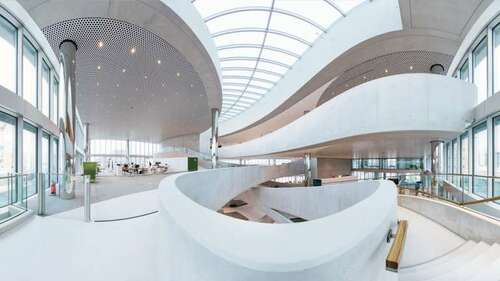Merck Invests More Than € 300 Million in New Life Science Research Center in Darmstadt,Germany
DARMSTADT, GERMANY – Merck, a leading science and technology company, is investing more than € 300 million in a new research center at its global headquarters in Darmstadt, Germany. In the Advanced Research Center, the Life Science business sector will research solutions for manufacturing antibodies, mRNA applications and additional products required for biotechnological production, among other things. As of the start of 2027, it will provide space for around 550 employees. Today, Merck laid the cornerstone for the building together with German Federal Chancellor Olaf Scholz. The new building is part of an investment program in the Darmstadt site: Merck will invest around € 1.5 billion in total by 2025.
Federal Chancellor Olaf Scholz: “Investments such as those made by Merck here at its headquarters in Darmstadt make tremendous economic, medical and scientific sense. They are a tribute to Germany as a leading pharmaceutical, industrial and research location and reflect the strength of the life sciences. All of this proves that we are on the right track with the changes that we have made with a view to offering the pharmaceutical and biotech industry better conditions. The German Government will continue to tread this path with all due resolve.”
“With this strategic investment, we are strengthening the leading position of Merck in key technologies for the development and manufacture of novel medicines,” said Belén Garijo, Chair of the Executive Board and CEO of Merck. “As a leading provider of life science technologies, we continue to invest in research and development ‘Made in Germany’. In doing so, we are enabling scientific progress for the benefit of millions of patients and customers around the world.”
The Advanced Research Center brings together research on key technologies of the Life Science business sector of Merck. These include raw materials and processes for researching and manufacturing antibodies, recombinant proteins and viral vectors. The company also researches cell culture media and pharmaceutical formulation and purification aids as well as digital reference materials. In addition, the scientists are developing analytical chromatography further. This is a method for separating, identifying and quantifying chemical substances in a sample. Research along the mRNA value chain will also be based in the new center.
With the Advanced Research Center, Merck is supporting its customers in Europe and globally when it comes to finding solutions for crucial medical challenges. Antibodies and recombinant proteins are used to treat cancer, autoimmune diseases and infectious diseases, among other things. Viral vectors are predominantly used in gene therapies and vaccines while mRNA is currently being researched mainly for vaccines and cancer treatments. Research on these therapies is developing rapidly and is constantly opening up new application possibilities. In the area of mRNA alone, more than 740 clinical trials are currently in progress globally.
With around 18,000 square meters, the Advanced Research Center enables collaboration across departments in an open, modern work environment. Merck is planning almost carbon-neutral research operations. Energy supply is based on photovoltaics, geothermal energy and air-source heat pumps. The specially designed facades and the green roofs also help to save energy and improve the microclimate. The building is striving for gold certification from the German Sustainable Building Council.
The Darmstadt site is one of the most important Merck centers for research and development in life science technologies. In the next ten years, approximately one fifth of the Life Science business sector’s sales with new products are estimated to come from here. Since 2020, Merck has announced investments of more than € 2 billion in the business sector globally. The objective is to expand Life Science’s capacities and capabilities to meet the globally increasing demand for medicines.
Latest news
Clariant's MegaMax™ 900 catalyst: Powerful start at European Energy's e-methanol plant
European Energy successfully started up their e-methanol plant in Kasso, Denmark, using Clariant’s MegaMax 900 catalyst. The Power-to-X plant is one of the world’s first and currently largest comme...
Kazakhstan’s largest petrochemical project: first piles driven for polyethylene plant in Atyrau
The construction of the plant, which has a capacity of 1.25 million tons of polyethylene per year and an investment of approximately 7 billion US dollars, is expected to be completed by 2028, with ...
Vynova Alkoxides GmbH awards first basic engineering contract for new alcoholates plant at the Lülsdorf site in Germany.
Vynova starts the construction of a new alcoholates plant at the Chemiepark Lülsdorf. A contract for basic engineering has been awarded to an external engineering company for finalising the basic d...
Norway: TotalEnergies and partners launch the 2nd phase of Northern Lights CCS project
Northern Lights will increase its CO2 storage capacity to more than 5 Mt per year. Northern Lights signed a commercial agreement with Stockholm Exergi for transport and storage of 900 kt CO2/y, fro...

